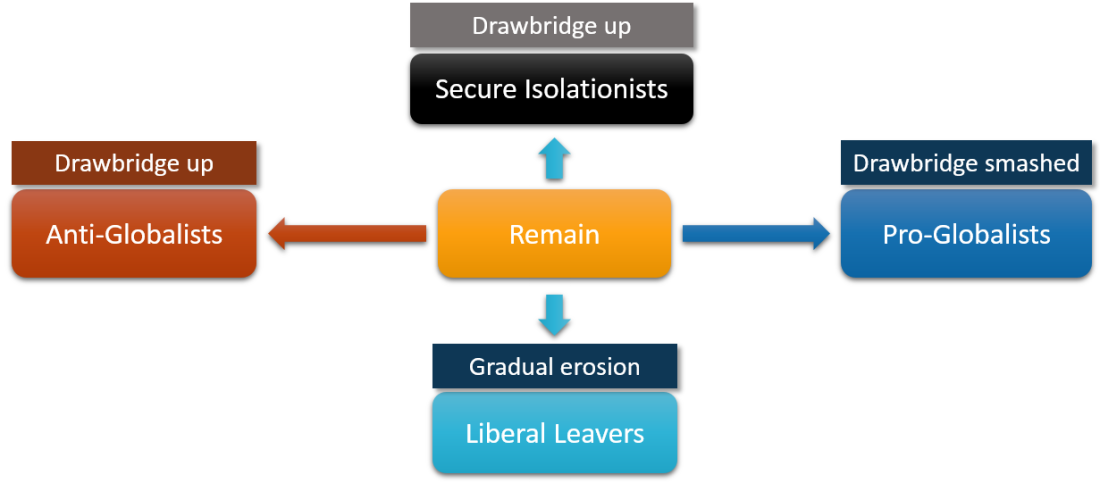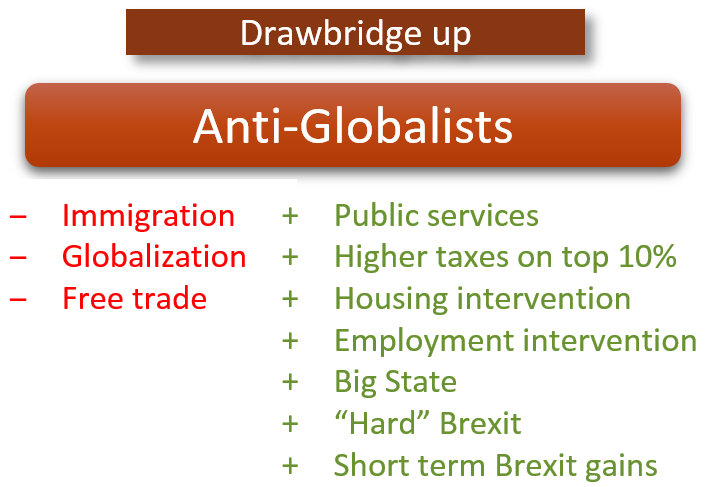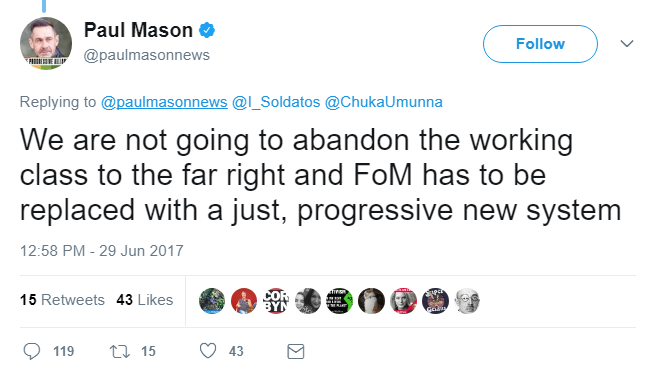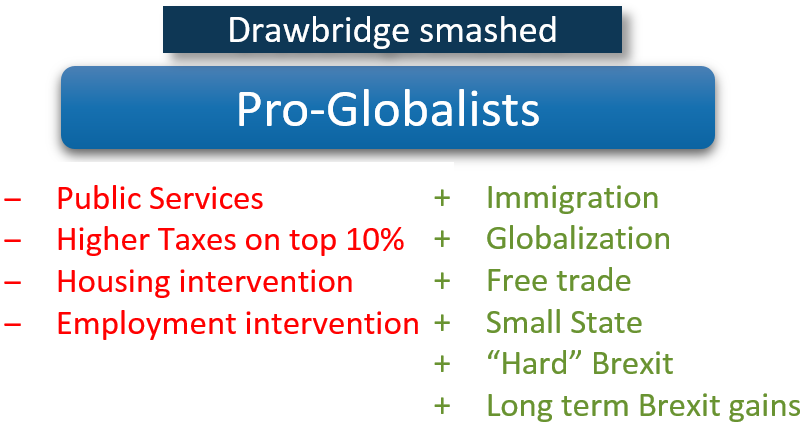Note: I wrote this blog just after the referendum. Most of it is still current with one significant exception – Jeremy Corbyn has appeared as the voice of the anti-globalists. This will please or dismay you depending on your attitude to a vision of “socialism in one state” which is essentially the current Labour Leadership message. Additional notes to reflect this have been added.
The Leave campaign pulled in 52% of the vote, but who are the leave voters, and what do they have in common? Below is an attempt at segmenting the vote though of course any groupings are by necessity generalizations and many people will not simply fit in one group.
Remain
Remain is at the center. It represents 48% or so of the population all of whom are largely aligned around a single position, staying in the EU, and as such can be considered a considerable block.

The 4 leave segments that in effect “surround” remain are shown above. However, although all 4 may have some common ground in their concerns around UK sovereignty (or perceived lack of within the EU) there is very little else they have in common.
Secure Isolationists
Secure Isolationists are Leave voters with 2 major characteristics, namely a) they are against EU membership as a matter of principle and b) they are shielded, or at least see themselves as shielded, from any economic fallout from Brexit.
Note: “-” means “against”, “+” means “for”, as in anti-globalists are against immigration.

They may be independently wealthy (or at least have a secure income) and/or have no mortgage to pay, and many of them have been firmly anti-EU either since the introduction of the Euro, the signing of the Maastricht treaty or indeed since the 1970s.
They are the ‘Brexit at any cost’ camp because they won’t pay the price
As such, they have little interest in the economic or cultural pros and cons of EU membership, the details of any deal struck with the EU or in how long it will take the UK to recover. They are the “Brexit at any cost” camp, in part because they won’t pay the price, and if asked would be supporters of a rapid “hard” Brexit. This group will be most entrenched in its pro-brexit position and is “drawbridge up” in its mentality. This analysis of a Times article indicates the “no compromise” approach this group favors.
Liberal Leavers
Liberal Leavers understand the complexities of leaving the EU and the economic damage a poorly judged Brexit would cause.

In some cases they may even be closet “remainers” who found it politically expedient to support Leave but now regret the win. As such they are looking for a “Norway” style model as an interim compromise until trade deals can be struck with other non-EU countries or, alternatively, they recognize the significant benefits of EU membership and so are looking for a “Norway” approach as a “token” Brexit.
In any case they seek to gradually erode the barriers between the UK and the none EU world in order to limit damage and disruption. Again, this analysis of a Boris Johnson column helps illustrate the Liberal Leaver view.
Interestingly the “threat” of a Corbyn Brexit is pushing many liberal leavers back to a soft brexit so that the UK sits under the “protection” of the single market. The thinking is that this limits Corbyn’s traditional socialist agenda (state subsidy of industry and wide ranging nationalization as deemed necessary). Some Liberal Leavers are even considering abandoning Brexit all together for this very reason.
Anti-globalists
“Anti-globalists” are concerned about immigration, wages, pressure on public services, zero hour contract and other insecure jobs. They will generally be against free movement, globalization and free trade insofar as they believe that these issues create uncertainty and insecurity. In as much as they want protection from the effects of globalization they represent the “drawbridge up” mentality.

They will likely be pro higher taxes for the well off and for companies, pro workers rights, pro public services and would generally like to see more flexible accommodation options through either cheaper housing, reduced rents or more council housing choice.
The leave campaign were able to convince this group that the EU, and specifically Immigration, was a major factor in the above issues, and that leaving the EU would solve them.
The irony however is that although this group represents the largest section of the Leave camp there is no authentic political voice which speaks for them, primarily because they have been sold a “false vision” of a future Britain which, having turned its back on globalization, would then be able to deliver more secure jobs, higher wages and greater housing choice.
Since writing this blog Jeremy Corbyn has emerged as this “authentic political voice”. That said, it remains the view of the author that this a false vision as protectionism rarely leads to prosperity, especially as the disconnect from the EU caused by Hard Brexit will cause significant economic pain for the anti-globalists.

Unfortunately, although “Migrant bashing” is not a natural area for Corbyn and his team it looks as though they are beginning to adopt this in order to play to the anti immigrant emotions raised by the Leave campaigns. Freedom of Movement is being portrayed as an enabler of exploitation, particularly of British Workers. In the same way that the worst aspects of the Leave campaign unfairly blamed contributing immigrants for pressures on Housing, the NHS and other services, the Labour Leadership are unfairly blaming immigrants for pressures on wages and working conditions. This is a worrying development for a group describing itself as “progressive”.
Pro-globalists
The next group is likely one of the smallest however conversely it holds much of the power. These “pro-globalists” are concerned about “excessive” regulation of any kind, a lack of world trade deals and general inflexibility which they perceive as being the major downsides of EU membership.

Fundamentally they are free marketeers and so they resent the limitations that EU membership creates around workers rights, new trade deals etc and believe that the market should find its own level in most areas. As such they will likely have little interest in limiting immigration as free movement is just another free market. They will also likely have little interest in housing intervention, believing that people can and should move to areas of cheaper housing rather than relying on state intervention to manage the issue.
Finally as free marketeers they will generally believe in small state and will look for public services to move into the private sector, which they believe will become more efficient over time due to market forces.
Most importantly, they believe in unrestricted free trade with the rest of the world. As such they represent the “smash the drawbridge” mentality as illustrated in this analysis of a pro-globalist article in the Telegraph.
Clearly of course there are other issues around nationalism (which can move into racism) and sovereignty/democracy however I won’t cover these here.
A (simplistic) categorization would say that the official Vote Leave campaign under Johnson began with an appeal to the pro-globalists and liberal leavers, whereas Leave.EU under UKIP and Farage appealed to the anti-globalists and secure isolationists.
Core paradox and why the answer is the EU
The Secure Isolationists want hard brexit immediately and will not be happy in almost any scenario. The Liberal Leavers are trying to find a compromise however in reality although for Remainers a Norway approach is the least worst option it has few benefits and many issues when compared to full EU membership.
Put simply, everything the anti-globalists want to protect or extend the pro-globalists want to dilute or destroy
However, the key issue for the post brexit consensus is the utter divergence in world views between the Anti and Pro globalists. They may find common cause around a perceived impact on UK sovereignty but that aside they have very little in common, put simply everything the anti-globalists want to protect or extend the pro-globalists want to dilute or destroy. In fact, the compromise solution which will satisfy neither but which sits squarely between them, is, ironically, EU membership.
This is primarily because the EU provides a “liberal anchor“, avoiding excessive protectionism and supporting a very high degree of free trade (especially in comparison to the rest of the world) whilst at the same time providing a common floor of worker protections, regulations and human rights and thus reducing the chances of exploitation.
It is this “liberal anchor” – the framework of the single market which aims to prevent excesses – which has created such antipathy in the Tory Party Pro-globalists and in Corbyn’s anti-globalists. Although nominally from opposite ends of the political spectrum they both wish to break away from the single market in order to radically reshape British society and its economy.
The alternatives are to move further to the left of this anchor which risks the creation of long term stagnation or to the right, which may eventually lead to long term prosperity but will create significant disruption in the short term and will likely see increased insecurity for many in the long term. Perhaps more importantly, the larger Anti-globalist group will feel betrayed as Brexit will not resemble in any way the vision they were sold. In reality, there is no compromise vision that will satisfy all 4 but if we concede that the Secure Isolationists will not accept any compromise then full EU membership represents the most practical solution for the other 3.
They must now try to satisfy 4 conflicting sets of interests, whilst also reaching out to the 48%
This division is the nature of the current paradox facing the Brexit leaders post referendum and the main reason why things are not progressing. (note: this blog was written a year ago but progress is still minimal, in fact the government negotiating position is, if anything, even less clear than it was a year ago) Having appealed to the anti-globalists on a platform of immigration they must now try to satisfy 4 conflicting sets of interests, whilst also reaching out to the 48%. And all this has to occur whilst negotiating with 27 other countries who, understandably, are somewhat miffed.
However, although Leave represents 52% of the vote, in reality this represents a loose coalition of 4 disparate groups, each representing no more than 25% of the total population, with opposing views in almost all areas and whose only common ground is that they all voted for an unspecified and deliberately vague Brexit. They will not find a solution that satisfies all of them. The only sane & practical answer is to return to some variation of remain, and the only thing really stopping this is the political difficulty of admitting the referendum was too simplistic and too vague and therefore fatally flawed.
Since this blog was written nothing has changed other than the emergence of Corbyn as a credible political force. Secure isolationists still exist and simply want Brexit, they’re just impatient that it’s taking so long. Liberal Leavers are frustrated with Pro Globalists/Secure isolationists because they feel (correctly) that these groups are underestimating or dismissing the complexity of Brexit. They are also in fear of Corbyn as they did not anticipate that leaving the EU would allow a return to a traditional socialist economy.
But what’s most interesting is the love/hate relationship between Corbyn & the Tory hard Brexiteers. They both want out of the Single Market and so Corbyn is supporting Tory brexit actions as appropriate but both also want the prize of post brexit Britain without the pain of the inevitable economic damage. Both also are trying not to scare off their soft brexit/no brexit voters by essentially identical “cake and eat it” brexit visions which offer “full SM acccess but without Freedom of Movement”. This single vision, differing in name only (“Best Deal for Britain”, “Jobs first Brexit”) is impossible, and both parties know it. The fact that both can still peddle this vision, especially as 2 distinct versions which are actually the same, 12 months on is both remarkable and deeply worrying, as it reflects the utter inability of our media to hold our politicians to account.
To conclude, the original purpose of this blog was to illustrate that returning to the EU was the only pragmatic middle ground between the various leave factions. Since then, EU and particularly Single Market membership has morphed from reasonable compromise to necessary protection. Corbyn’s traditional socialism may or may not be the right model for the UK, in the same way that a pro-globalist low regulation low tax Singapore model might or might not lead to greater prosperity.
The point is however almost no-one voted for either of these 2 outcomes, nor would they have if they had been presented in these terms. They especially would not have voted for the very real economic damage a “hard” brexit entails. Several countries have left fascism and then joined the EU, its nature limits damaging extremism. We likely need the EU more than ever to temper the ideologues in positions of power in Labour and the Conservatives.

We should never have been given the vote there are to many stupid people out there
LikeLiked by 1 person
I think statistically you will find stupid people on both sides of the vote. However it would seem, as avid envied by your comment, that the remain voters appear to have the upper hand in terms of arrogance.
LikeLike
Perhaps. However so far I personally have managed to have 3 reasoned discussions with Leavers but about 20 like this one
https://musealoudblog.wordpress.com/2016/08/10/handy-post-brexit-exchange/
The pattern is usually the same, bald statements, bluster, possibly a few insults before the leaver disappears. Most cannot make an argument that stands up to a minutes examination so as soon as they are challenged in even the mildest way they leave the discussion.
Added to that they are often unnecessarily rude, aggressive, dismissive of other viewpoints (and even other leavers who they label stupid and sheep like for not seeing through leave propaganda)
There may be similar people on the remain side, I just haven’t seen them.
LikeLiked by 1 person
“too”
LikeLike
We should not have been given the vote there are to many stupid people out there
LikeLike
Yes, the only answer is ‘Remain, review & renew.’ And yes, this is a hard sell, for two reasons.
-Loss of ‘face’. (I put this 1st just to get on)
-Realizing a willingness within the EU for Democratic reform. (pet. 2 below)
I divide the Leave vote into two camps:Those many who vote ‘for’ Leave, and some – hard-line, who voted ‘to’ Leave. The former will come round to Remain fairly readily – given the 24/6 climb-downs. The latter – well who cares?
How to bring the establishment round? (pet. 1 below)
1-https://www.change.org/p/jeremy-corbyn-mp-brexit-up-with-this-i-shall-not-put
2-https://www.change.org/p/peoples-of-europe-unite-with-the-people-of-the-uk
KISS
LikeLike
Thanks Tom, will take a look
LikeLike
This is great – really clearly sets out the competing interests. I hadn’t thought about continued EU membership being the best way forward in this way before – my thinking was along the lines of “if we’re going to get a diluted Brexit, is that actually better than membership?” and of course the answer is no.
But yeah – long story short, this is great.
LikeLike
Thanks Frank, much appreciated. Just for interest, how did you come across this? New to blogging and interested in understanding how these things disseminate.
LikeLike
That’s a toughie – I believe it was tweeted out this morning.
Yes, here it is. Retweeted by @proremain:
Not sure where Tony got it from; you’ll have to ask him as he’s pinned it to his Twitter page.
LikeLike
Ahh that’s me – need to work on my “joined up branding” 🙂
LikeLiked by 1 person
If you’d like to track its journey you can also see my tweet:
LikeLike
Thanks, 4 retweets – excellent stuff
LikeLike
Very clear and sound analysis. In fact there is a majority support for remain in the population living in Britain, as opposed to those who voted. No attention seems to be given to this. If you look at differential turnout by age and adjust to find would occur if the turnout was the same in all age groups, then I have calculated that marginally over 50% of the electorate supported remain. But in addition there are the disenfranchised residents – under 18s, foreign citizens including EU residents, and British citizens who have been abroad for more than 15 years. These are all likely to be overwhelmingly pro-remain (the vote in Gibraltar may give a clue). For an advisory referendum, this is the important conclusion from the vote. I care particularly about the EU citizens. If you agree please sign: https://petition.parliament.uk/petitions/159488
LikeLike